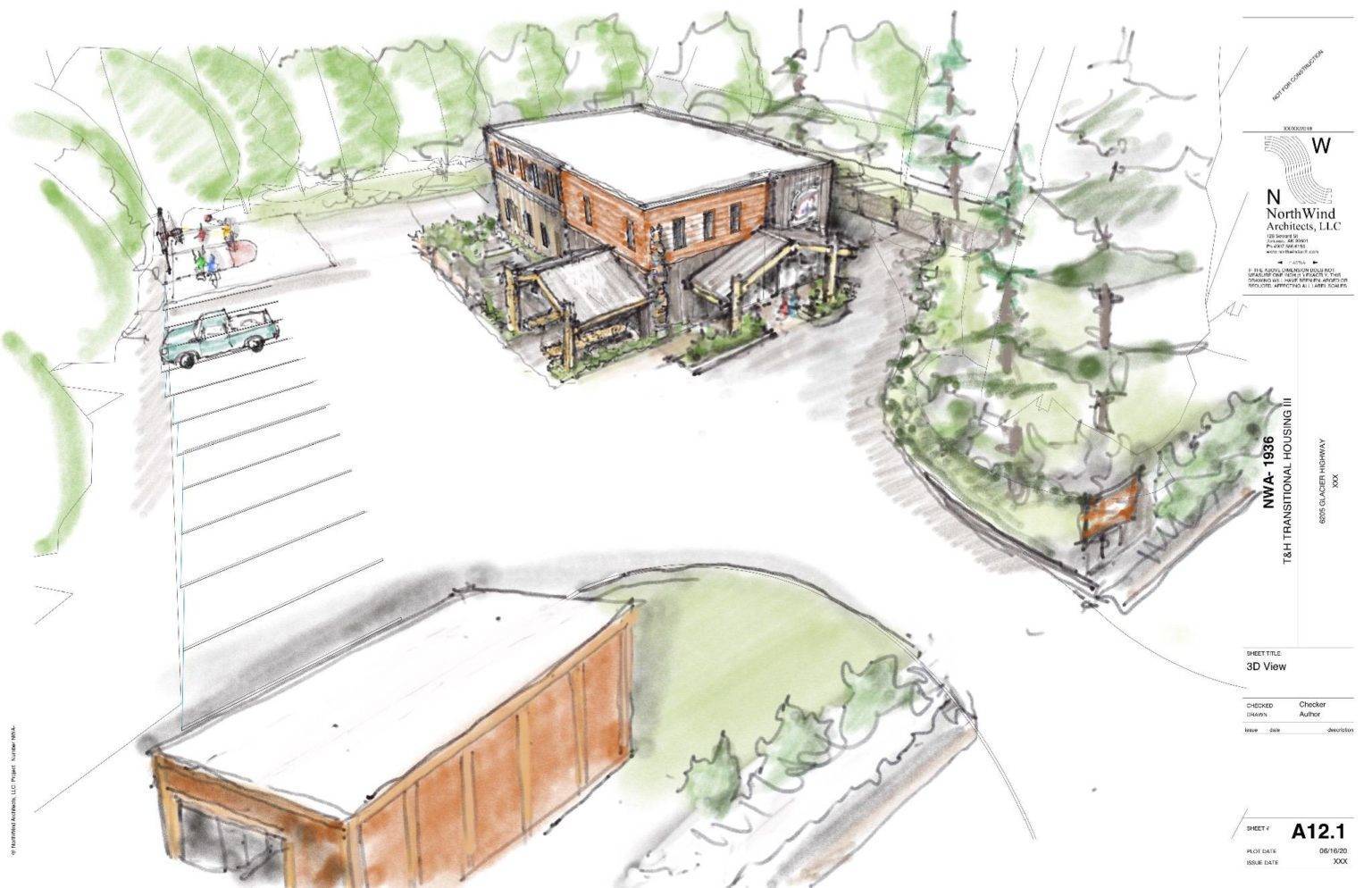Opponents of Central Council of the Tlingit and Haida Indian Tribes of Alaska’s plan to build a transitional housing facility for people recently released by the Department of Corrections made their case to reverse the city’s decision to allow the project in a Zoom hearing Monday evening.
An attorney for Tlingit and Haida said the project fills a critical community need and should be allowed to go forward. The City and Borough of Juneau defended the permitting process that cleared the way for the development.
Concerns center around plans to build the facilities at 6205 Alaway Avenue, near the police station. CBJ issued a special use permit over the summer, allowing the development in an area zoned for industrial use. The city accepted an appeal against the permitting of the facility in the fall based on community concerns.
Opponents of the plan say the Planning Commission approved the request for inappropriate reasons and based on incorrect findings. They cite a concern about sex offenders at the facility and its proximity to a school and school bus stops.
Both CBJ and Tlingit and Haida said that the facility would not serve as a destination for sex offenders.
CBJ officials also said that the Planning Commission followed all the rules for public notice and hearings and that not liking a decision is not a reason to reverse it.
City accepts transitional housing appeal
Making the case
“We are here to address a mistake made by the Planning Commission,” Lemon Creek resident Shawn Wille told Ketchikan-based hearing officer Scott Brandt-Erichsen. “This location is in a school zone, a very busy school zone.”
Keri Weldon, who was part of the appeal, said that the decision was made too quickly.
“This was a dangerous and reckless decision recommend by development staff. It was bulldozed through because CARES money must be spent. The decision is based on inadequate facts,” Weldon said.
Weldon and Wille said that the facility is in a school zone near Dzantik’i Heeni Middle School and that although Tlingit and Haida say that sex offenders will not be eligible to apply for the programs there, CBJ lacks the authority to enforce that rule.
They said the neighborhood is “diverse and socially and economically challenged” and the wrong location for the facility.
“We talked to all kinds of entities about this facility, and everyone said red flags, red flags, red flags,” Weldon said. “I think this is insane.”
Tlingit and Haida works to bring transitional housing projects to life
CBJ: All rules were followed
Sherri Layne, assistant municipal attorney for CBJ, said that despite statements by Weldon and Wille, the decision was well researched and well thought out.
“The Planning Commission did its job here,” Layne said. “They evaluated all the evidence.”
Layne said that city staff provided notice of the Planning Commission’s meeting following CBJ code, including mailing notices to residents a month before the meeting and positing signs about the affected neighborhood’s hearings. She said that an additional step was added to the process that included a neighborhood meeting coordinated between Tlingit and Haida and the city.
“The notice worked. We got 58 comments on the development,” Layne said. She added that Weldon and Wille had both participated in the hearings, which shows that the hearings were public and publicized.
“Mr. Wille and Ms. Weldon both submitted correspondence. The Eagles Ridge homeowners submitted a letter. It was all in accordance with code,” Layne said.
“This was not fast-tracked or bulldozed. The commission followed normal protocol for meetings,” Layne said, noting that the public meeting was conducted by Zoom. “The commission did not take their job lightly. The record shows that they did their job. They read all comments.”
Meeting a critical need
Kendri Cesar, an attorney representing Tlingit and Haida at the hearing, said the facility meets a critical community need.
“Supportive housing is critical for re-entry,” Cesar said. “The project allows the opportunity to reduce recidivism and improve public health as it’s not a congregate setting,” she said.
Cesar said the facility is modeled after the successful Haven House development and will be staffed with professionals and enforce house rules to support recovery.
“There is no crystal ball to recidivism, but there is the possibility of beautiful success stories. We are committed to resident success,” Cesar said.
Cesar told Brandt-Erichsen that the evidence shows that all procedures were followed and that the permit was issued in accordance with all requirements.
“Despite their claim that the decision is not supported by evidence. There is substantial evidence. Just because the appellants disagree with evidence doesn’t mean it’s inadequate. The appellants want a second bite at the apple to get a different result,” Cesar said.
Sex offender concern
One of the primary concerns expressed by Wille and Weldon centered around the idea that sex offenders could live in the facility and that CBJ has no mechanism to revoke the facility’s permit or stop the practice once it starts.
“The CBJ needs regulation, like a means to revoke the permit when bad things happen,” Weldon said. “We can’t assume that they will never have a sex offender there.”
However, according to Cesar, sex offenders are ineligible for consideration in the center’s programs, and there are no plans to add them in the future.
“It was stated over and over again that sex offenders would not be allowed in the facility. It’s part of the permitting process. Those convicted of sex crimes will not be allowed in the facility,” Layne said.
Next steps
Brandt-Erichsen said that he would draft and circulate a proposed decision “substantially before” the 45-day statutory deadline. The proposal will be circulated to all parties for a five-day comment process with three additional days to respond to comments. The city clerk will distribute the proposed decision when it’s available.
• Contact reporter Dana Zigmund at dana.zigmund@juneauempire.com or 907-308-4891.

